|
|
|
Sort Order |
|
|
|
Items / Page
|
|
|
|
|
|
|
| Srl | Item |
| 1 |
ID:
089033


|
|
|
|
|
| Publication |
2009.
|
| Summary/Abstract |
Negotiations among members of international institutions often stalemate yet the outcomes vary. Sometimes talks end in impasse and other times in agreement. Several familiar theories are unable to explain the contrast between two prominent outcomes in the World Trade Organization-its 1999 deadlock in Seattle and its 2001 agreement in Doha, Qatar, on an agenda for a new round. Extensive original evidence from these cases documents mechanisms that can tip the negotiation process between impasse and agreement in any institution, not only economic ones. The study illustrates benefits for international relations research of building on the relatively neglected tradition of negotiation analysis, a substantial part of which is outside political science.
|
|
|
|
|
|
|
|
|
|
|
|
|
|
|
|
| 2 |
ID:
089036
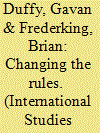

|
|
|
|
|
| Publication |
2009.
|
| Summary/Abstract |
Constructivists often refer to the end of the Cold War to illustrate their contention that social rules are not immutable. Agents can change the rules by performing actions that undermine them. In this article, we describe the Cold War as a set of social rules sustained by superpower speech acts. We show that, by altering their behavior, the superpowers undermined the felicity of these rules. In so doing, they progressively dismantled the rules of the Cold War. Our model captures the competing arguments in the ongoing debate about whether the rationalist buildup argument or the constructivist new thinking argument better explains the end of the Cold War. Within the model, we identify the rules that, when made infelicitous by the superpowers, resolves tensions in the Cold War rule system in ways consistent with each argument. We conclude by showing how these competing arguments are reflected in contemporary debates concerning the nature of the global security rules emerging in the post-cold-war world.
|
|
|
|
|
|
|
|
|
|
|
|
|
|
|
|
| 3 |
ID:
089040


|
|
|
|
|
| Publication |
2009.
|
| Summary/Abstract |
Once viewing African languages as competitors to French, policymakers in France now welcome these languages openly in African schools. This is a dramatic policy reversal, and it contradicts expectations of path dependency and policy inertia. The policymakers' conversion can be traced to the writing and advocacy of a strategic scholarly community, which began exercising influence over the leadership of France and la Francophonie in the 1990s. Their influence changed the perception of French leaders regarding the utility of local languages in education and caused them to include this element consistently in their education strategy for Africa. In contrast, a lack of comparable agreement within the intellectual communities of the Anglophone world has led to ambivalence in support for mother tongue education emanating from dominant English-speaking states. Unlike traditional accounts of epistemic communities, this study highlights the strategic political activity of scholars. The major focus is on the process of idea change among policy makers in France. I suggest that this idea change altered the field of permissible options for African leaders, revealing a continued ideational dependency between metropole and periphery.
|
|
|
|
|
|
|
|
|
|
|
|
|
|
|
|
| 4 |
ID:
089049


|
|
|
|
|
| Publication |
2009.
|
| Summary/Abstract |
The debate on whether class-based or industry-based coalitions are politically salient in American trade politics has illuminated domestic sources of international trade policy but remains unresolved. In particular, the literature offers contradictory evidence on the dominance in recent years of class-based or industry-based trade politics. This contradiction is mainly due to selective use of congressional votes. This article contributes to this debate by applying a multilevel item-response-theory model to the entire universe of trade-related votes since 1987. This study finds that class-based coalitions are politically salient in current U.S. trade politics. Furthermore, while this study confirms the significance of party influence on trade voting, it finds little support for the view that political parties have dyadic relationships with particular groups of constituents.
|
|
|
|
|
|
|
|
|
|
|
|
|
|
|
|
| 5 |
ID:
089039
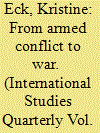

|
|
|
|
|
| Publication |
2009.
|
| Summary/Abstract |
This article presents a new line of inquiry into ethnicity and armed conflict, asking the question: are conflicts in which rebels mobilize along ethnic lines more likely to see intensified violence than nonethnically mobilized conflicts? The article argues that the ascriptive nature of ethnicity eases the identification of potential rebels and facilitates a rebel group's growth, leading to an increased risk for war. This proposition is empirically tested using a Cox model on all intrastate armed conflicts 1946-2004; the results show that ethnically mobilized armed conflicts have a 92 percent higher risk for intensification to war. In extending the analysis, the study finds that the vast majority of conflicts intensified in the first year, but for every year a low-scale conflict remained active thereafter, the risk of intensification increased, peaking around year 12.
|
|
|
|
|
|
|
|
|
|
|
|
|
|
|
|
| 6 |
ID:
089035
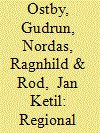

|
|
|
|
|
| Publication |
2009.
|
| Summary/Abstract |
The case study literature is ripe with examples of a positive association between inequality and civil war, but systematic country-level studies have largely failed to find a significant relationship. One reason for this discrepancy may be that large-N studies tend to ignore spatial variations in group welfare within countries, although civil wars often take place within limited areas. We address this gap in the literature by applying GIS operations to Demographic and Health Surveys to construct new disaggregated data on welfare and socioeconomic inequalities between and within subnational regions in 22 countries in Sub-Saharan Africa. These measures are coupled with geographical data on the location of conflict zones for the period 1986-2004. We find that conflict onsets are more likely in regions with (1) low levels of education; (2) strong relative deprivation regarding household assets; (3) strong intraregional inequalities; and (4) combined presence of natural resources and relative deprivation.
|
|
|
|
|
|
|
|
|
|
|
|
|
|
|
|
| 7 |
ID:
089045


|
|
|
|
|
| Publication |
2009.
|
| Summary/Abstract |
While there is a considerable degree of consensus about the economic determinants of foreign direct investment (FDI), the role of socio-political factors has only recently come under scrutiny. In this study, we build upon research on one such factor, human rights. Specifically, whereas extant research into FDI examines aggregate investment indices, we seek to disaggregate the analysis of FDI to further assess the role of human rights, namely physical integrity rights, in investment decisions. As FDI is a heterogeneous enterprise, we posit that the importance of human rights varies in part due to the nature of the industrial sector. In particular, two factors that vary across industrial sectors-skill requirements and the degree to which societal acceptance or "social license" is sought-likely increase the salience of human rights concerns in investment decisions. To empirically assess these linkages, we analyze U.S. FDI across 10 different sectors. We find human rights to be a significant determinant of FDI across sectors that value higher skills and integration within the host society.
|
|
|
|
|
|
|
|
|
|
|
|
|
|
|
|
| 8 |
ID:
089038
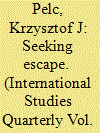

|
|
|
|
|
| Publication |
2009.
|
| Summary/Abstract |
In agreements that include flexibility enhancing mechanisms such as escape clauses, how do institutions realize the benefits of flexibility while preventing its abuse? The conventional wisdom is that escape clauses must be made costly, but I show this claim to be at odds with empirical observation. In the GATT/WTO, the institution where escape clauses are most prevalent, compensation following escape was only widespread in the 1950s. Since then, it has been progressively abandoned, in favor of appeals to exception. This alternative mechanism relies on an institution's ability to verify the severity and exogeneity of the domestic circumstances of states seeking temporary escape. Relying heavily on GATT archives, I show how early on in the institution, members had made the link between costless escape and increased monitoring, and pursued reforms to achieve both objectives. The success of members' ability to verify escapees' domestic circumstances is observed in the record of safeguard disputes throughout the GATT/WTO's history. Finally, I use the hypothesized link between verifiable information and the chosen escape mechanism to explain an otherwise puzzling GATT incident, that of French emergency trade measures in 1968.
|
|
|
|
|
|
|
|
|
|
|
|
|
|
|
|
| 9 |
ID:
089041


|
|
|
|
|
| Publication |
2009.
|
| Summary/Abstract |
This article investigates the conditions under which states use General Agreements on Tariff and Trade (GATT)/World Trade Organization (WTO) legal measures rather than bilateral or unilateral instruments to protect domestic industries. Contrary to the conventional wisdom that international trade has become increasingly legalized and multilateralized, we demonstrate that domestic electoral politics loom large in a state's decision to resort to international law. Legislators' need to mobilize votes and campaign donations and the electoral systems had substantial effects on the government's choice to use GATT/WTO compliant protection among a wide array of protectionist instruments. The article tests this argument using new commodity-level data on trade instrument choice (subsidy, voluntary export restraints [VERs], and GATT/WTO legal measures) from the second largest economy that has experienced major electoral reform, Japan. The results lend strong support to our argument. Higher electoral competition is associated with the likelihood of using VERs and the electoral reform of 1994 was a force behind the sudden surge of legislators' interests in using WTO legal safeguard measure. The article finds, moreover, legislators strategically deviate from the new WTO rules, such as prohibition of VERs, when it is electorally beneficial to do so.
|
|
|
|
|
|
|
|
|
|
|
|
|
|
|
|
| 10 |
ID:
089043


|
|
|
|
|
| Publication |
2009.
|
| Summary/Abstract |
This article is a comparative analysis of sexual violence perpetrated by state armed forces during the Guatemalan and Peruvian civil wars. Focusing on the type of violation and the context in which it occurs provides new insights into the motives behind its use in war. It introduces a new data set on sexual violence compiled from truth commission documents and nongovernmental human rights organizations' reports. The data reveal that members of the state armed forces perpetrated the majority of sexual violations, that rape and gang rape are the most frequent but not the only abuses committed, and that women are the overwhelming majority of victims of sexual violence. Aggregate patterns suggest that state authorities must have known of mass sexual abuse and failed to act in accordance with international law. Moreover, some evidence suggests sexual violence is used as a weapon of war. However, mono-causal models cannot sufficiently account for the variation and complexity in its use. Even within the same conflict, sexual violence can serve multiple functions in different contexts and at different points in time.
|
|
|
|
|
|
|
|
|
|
|
|
|
|
|
|
| 11 |
ID:
089031
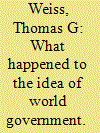

|
|
|
|
|
| Publication |
2009.
|
| Summary/Abstract |
What happened to the idea of world government, so central in the United States to public debate of the 1930s and 1940s, and why has it been replaced by "global governance"? This article reviews the reasons behind that evolution-the need to incorporate interdependence and nonstate actors into analytical frameworks along with a lack of imagination from analysts-as well as the pluses and minuses of both concepts. When states still could solve or attenuate most problems, world government remained a possible objective and not far from the mainstream. Paradoxically, now that states visibly cannot address a growing number of transboundary threats, world government is unimaginable; and even more robust international organizations are often looked upon askance. Could the same far-sighted American political commitment that created a new generation of international organizations after World War II re-emerge under the Obama administration, if not in 2009, then at least by the end of a second term?
|
|
|
|
|
|
|
|
|
|
|
|
|
|
|
|
| 12 |
ID:
089048
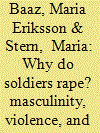

|
|
|
|
|
| Publication |
2009.
|
| Summary/Abstract |
This article explores the ways soldiers in the Congo speak about the massive amount of rape committed by the armed forces in the recent war in the DRC. It focuses on the reasons that the soldiers give to why rape occurs. It discusses how the soldiers distinguish between "lust rapes" and "evil rapes" and argues that their explanations of rape must be understood in relation to notions of different (impossible) masculinities. Ultimately, through reading the soldiers' words, we can glimpse the logics-arguably informed by the increasingly globalized context of soldiering-through which rape becomes possible, and even "normalized" in particular warscapes.
|
|
|
|
|
|
|
|
|
|
|
|
|
|
|
|
|
|
|
|
|